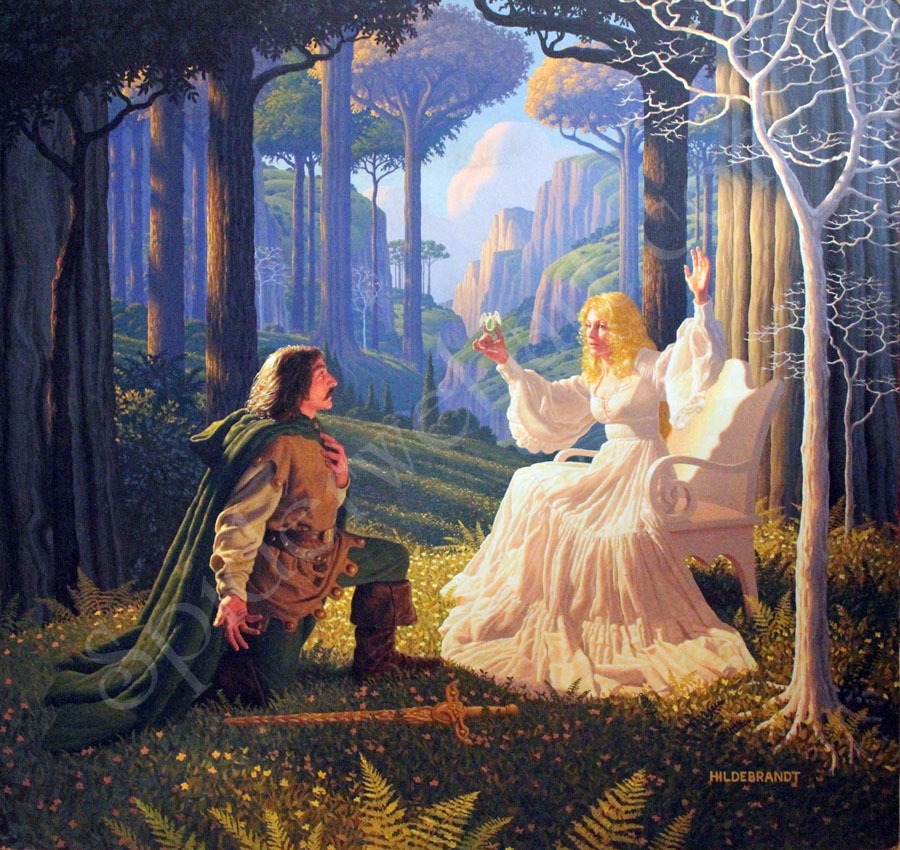The Two Towers by J.R.R Tolkien (Harper Collins 1991, 2007) pp. 730-734
Gandalf takes Théoden and Éomer around the walls of the flooded fortress of Isengard to find Treebeard and leaves Aragorn, Legolas and Gimli behind at the gatehouse with Merry and Pippin. So it is that the three hunters are reunited at last with the captives of the orcs in the very place in which Merry and Pippin were to have been held prisoner by Saruman. The young hobbits are able to provide their guests with a decent meal and a choice of wine or beer and then, when hunger is satisfied and a deep sense of contentment gently descends upon these friends Merry and Pippin are able to provide something that will deepen that feeling and that is Longbottom leaf, pipeweed of the very finest quality.
“Now let us take our ease here for a little!” said Ara Aragorn. “We will sit on the edge of ruin and talk, as Gandalf says, while he is busy elsewhere. I feel a weariness such as I have seldom felt before.” He wrapped his grey cloak about him, hiding his mail-shirt, and stretched out his long legs. Then he lay back and sent from his lips a thin stream of smoke.”

Strider in the Prancing Pony, magnificently realised by Anthony Foti.
All pipe-smokers will know the particular pleasure that is achieved through the careful practice of their art. A really good pipe requires the right state of mind in order that it might be fully enjoyed. If one comes to a pipe in an agitated state then that feeling will be transmitted to the experience; but if one is able to achieve an inner quiet before lighting a well prepared pipe then both pipe and the state of mind can deepen one another. This is Aragorn’s experience now at the end of nine days endless activity since he decided to go in search of the young hobbits across the plains of Rohan.
With some sadness I have to describe myself as a former pipe-smoker and so I have had to draw upon memories of some years ago. I never smoked more than one or, at the most, two pipes in a day and I always did so when the tasks of the day were done and I had a quiet moment for thought or in the pleasant company of a fellow smoker. So for me the experience of pipe-smoking and inner quiet are intimately and delightfully linked.
My pipe-smoking career came to an end when my older daughter came back from school one day and put a screen-saver on my PC with the words, “Daddy, you will die!” It seemed that she had had a class that day in which the dangers of smoking to health were presented to the children. As she listened to the teacher anxiety grew within her about her own father and so she worked out a way of telling me about this. I love my daughter very much and as soon as I saw the message I knew that I could not be the deliberate cause of anxiety in her and so I gave up smoking my pipe on that very day.
If you want to learn a little about the pleasures of pipeweed then could I please recommend a talk by Malcolm Guite that you can find on his YouTube channel. If you search for him on pipe-smoking you will find a number of short videos there as well as much good material, especially the work that he is doing at present on the retelling of the Galahad tales from the Arthurian legends.

Malcolm Guite with a pipe in his mouth.
It is Pippin who realises that, as he watches Aragorn smoke his pipe, that he is back in the Prancing Pony with the stranger who will eventually introduce himself as Strider. And as he remembers he speaks.
“Strider the Ranger has come back!”
And Aragorn replies: “He has never been away… I am Strider and Dúnadan too, and I belong to Gondor and the North.”
Pippin belongs to the North and it is there that he first met the man who would be his king both there and in Gondor. it was Bilbo who first introduced us to Aragorn as Dúnadan, man of the West, of Númenor, making us realise his deep lineage, beginning with Eärendil and Elwing, and, before them, Beren and Lúthien. And it was Gandalf who told us that to call Aragorn only a Ranger was to misunderstand him completely. Later Pippin would hail Aragorn as Strider in the presence of the lords of that land which would prompt the Prince of Dol Amroth to ask, somewhat sardonically, whether it would be in terms of easy familiarity like this that kings would henceforth be addressed. Aragorn’s reply displayed his mastery of the moment as well as his mastery of himself.
“Strider shall be the name of my house, if that ever be established. In the high tongue it will not sound so ill, and Telcontar I will be and all the heirs of my body.”

Aragorn, Son of Arathorn, Heir of Isildur and Elendil, Elessar of the House of Telcontar, Envinyatur, the renewer of Gondor and Arnor, Strider the Ranger in the Prancing Pony.
























